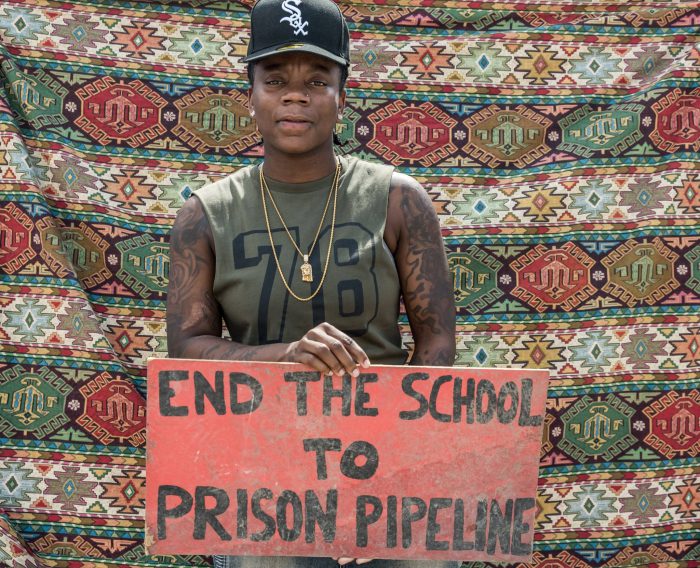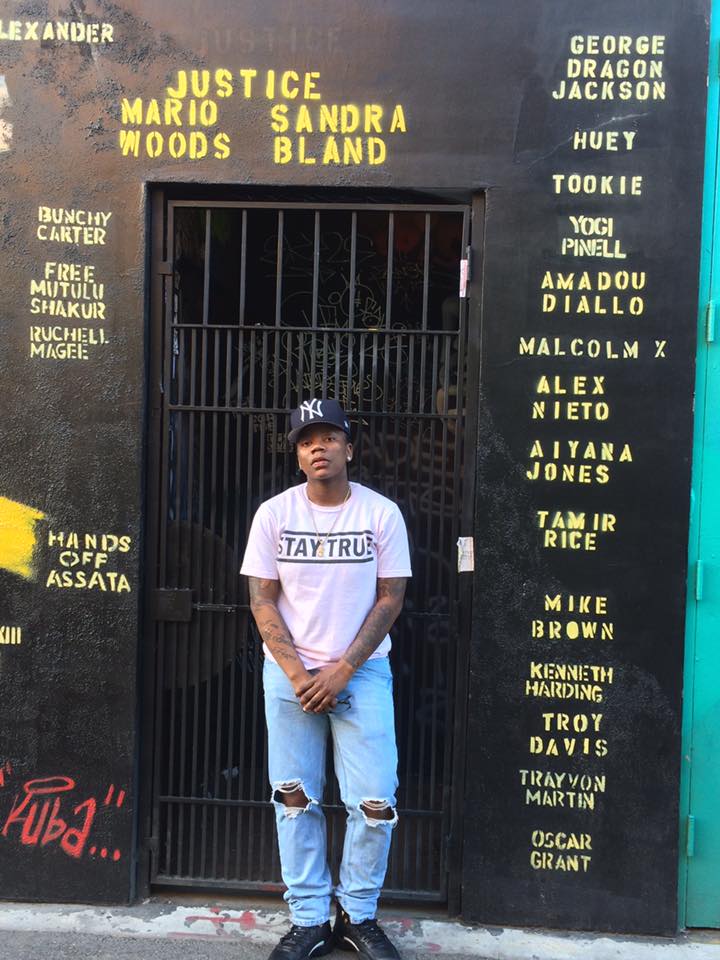Tweak G is a boisterous rapper and street activist from the Chatham/Auburn Gresham areas of Chicago. At a shallow glance, with a normalized lens of gender presentation, it is very easy to mistake Tweak as male. Tweak is adorned in tattoos and usually fashioned in Timberland boots, a fitted cap, and baggy denim. She is not only inherently unique in Chicago’s hip-hop scene and activist communities, as an unapologetic Black lesbian, she defies the typical idea of a soldier in the U.S. Army.
“Whenever I’m in this uniform, people look at me different,” says Tweak. “People would salute me when I’m walking down the 9 [79th street] and would say things like ‘Thank you for your service.’”
 To her sergeants and fellow soldiers, Tweak is known as 24-year-old Jasamine Harris, an Army six-year veteran. When called for service, she trades in her “men’s clothes” and microphone to wear the designated women’s uniform and helmet. The beginnings of this transition from civilian to soldier can be traced to when Tweak was a member of Doolittle Elementary School’s color guard team and Hyde Park High School’s ROTC program.
To her sergeants and fellow soldiers, Tweak is known as 24-year-old Jasamine Harris, an Army six-year veteran. When called for service, she trades in her “men’s clothes” and microphone to wear the designated women’s uniform and helmet. The beginnings of this transition from civilian to soldier can be traced to when Tweak was a member of Doolittle Elementary School’s color guard team and Hyde Park High School’s ROTC program.
“I was in ROTC all four years in high school. I didn’t want to do gym or P.E. All the girls gossiped and the guys just played ball. That was boring. I didn’t want to do any of that, so I chose ROTC. I was on the drill team. I was on the rifle team. I traveled and met a lot of people,” she says.
“As I progressed through high school, the question came if I was going to college or not. My family is broke as hell. I knew damn well I wouldn’t take out loans. I’m not trying to die in debt. It was only so much financial aid can do. To top it off, I was going through some things with my family and I wanted to get away.”
These early experiences influenced Tweak’s decision to choose the military. With her skillset, the Army was an easy decision in contrast to staying the course of academia while being crippled by college debt. According to Tweak, a minimum wage job and limited options after high school did not compare to being clothed, sheltered, and paid by the U.S. government and its citizens. The military, in some respects, was escapism from the socioeconomic conditions in which she was raised. However, her identity and sexuality raised some issues in service.
“A few soldiers assumed that just because I was gay, I liked them. My presence made some women feel uncomfortable. I had to constantly set the tone like, ‘Look I don’t want you. I’m not trying to date you. I’m trying to get trained and go about my merry way.’ Guys would assume that I would be having sex with all the girls, but it was not like that at all.”
She then continues about race, “A lot of the dudes, particularly the White guys, would give me a lot of crap just for being Black and a woman. We would bump heads because I wouldn’t take what they would dish out. You’re not gonna talk to me any type of way. You’re not going to say anything and expect me not to stand up for myself.”
Tweak states that the military holds “respect” as one of its pillars, and Black women, regardless of rank, have to work twice as hard to get it. She has witnessed Black women in positions of power have their authority challenged more frequently than their male peers.

“When the White male sergeants walk through and give orders, everyone stands at attention. Now, take a Black woman with the same rank. Some of the soldiers would have idle chatter on the side. The same respect is not there. With me, I demand respect from everyone. Sometimes I get ‘the angry Black woman’ treatment or people tell me I’m playing ‘the race card.’ First of all, Black women get sexually assaulted the most in the military.”
Tweak fights on several frontlines. Not only has she put her life in the hands of the United States military, but also her activism has yielded great wins for her community. In late December of 2014, Tweak and other members of Fearless Leading by the Youth pushed the University of Chicago’s Trauma Center to raise its age limit to 18, leading to more care for gunshot victims on Chicago’s South Side. In addition to this, Tweak has organized against police violence impacting Black women and girls.
“It’s difficult to fight for a country that doesn’t fully recognize your identity back home,” says Tweak. “All these deaths of Black women, Black queer women, Black transwomen, Black men, Black transmen, and yet I still serve. This was my way out of a bad situation.”
As Veteran’s Day approaches, Tweak believes there is so much that can be improved in caring for those who served in the military.
“I have a soft spot for veterans. You have teenagers going across the seas to fight the Taliban getting paid $20K or $30K a year, but people playing football are getting paid millions. We have soldiers losing limbs and eyes falling out of their sockets only to come home struggling to survive. Give them free housing, free healthcare, jobs…they earned it.”
You can support this veteran’s music at: soundcloud.com/tweakg15
